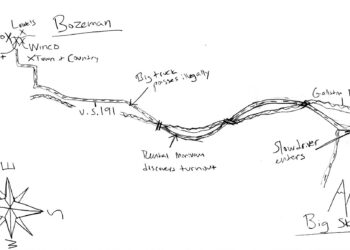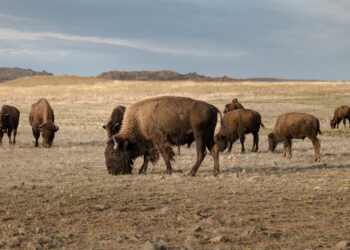By Joseph T. O’Connor ExploreBigSky.com Editor
The race for the Montana governor’s seat has been heated between Democrat Steve Bullock and Republican Rick Hill.
Bullock, 46, was born in Missoula. He earned a law degree with honors from Columbia University Law School in New York and has been Montana’s attorney general since 2008. His running mate for lieutenant governor is John Walsh.
Hill, 65, born in Grand Rapids, Mich., represented Montana for two terms in the House of Representatives from 1996 to 2000. He received a Juris Doctor degree from Concord Law School in Los Angeles, in 2005. His running mate is Jon Sonju.
Both interviews were edited for brevity.
EBS: Do you ski in Big Sky?
Bullock: We were there last winter, and we [visit] often during the summer, although this year’s a little hectic. The last time [my wife] Lisa, my family and I were up was over Labor Day, which we’ve done for the last eight years, doing the 5k and also hiking.
EBS: Talk about the importance of Big Sky and Yellowstone and their significance to tourism in Montana.
Bullock: It’s a special place to me. It seems like the Ousel Falls hike is just a walk in the park, compared to when we were carrying our kids. We’re getting closer each year to making it up Beehive Basin. More important is that tourism in Montana is our second largest industry. We’re seeing the economic impacts of it in winter [and] summer. It’s been a real connecting point for people across the state and across the world.
EBS: Part of Montana’s appeal is it’s the third least-densely populated state in the country. Yet Gov. Schweitzer expects it will eclipse 11 million visitors this year. How would you promote Montana tourism, and at the same time keep it for Montanans?
Bullock: It’s more than just showing our state, it’s also a big economic driver. Tourism brings in over $680 million per year. Promoting our state is essential. The last legislature tried to take bed tax dollars used for tourism and state promotion and use it for the department of corrections.
Promoting Montana isn’t just something that ends up through one medium or one technology or one opportunity. We need to coordinate the various regions of the state and bring people in all over.
We have 140,000 square miles with great treasures in all corners, and we finally hit 1 million people. We can enjoy the quietness, the places to hide, the places to hunt and fish. I don’t have great concerns we’ll be overrun. People come to Montana because of our quality of life, our unparalleled recreational access. I think we can have it all.
EBS: Gov. Schweitzer has one of the highest approval ratings in the country. How would you fill his shoes?
Bullock: [He has] done some incredible things, and I want to build on them. When other states were upside down, we’re one of only a couple that stayed in the black. The U.S. Chamber of Commerce recently said we’re eighth best in long-term growth and also one of the best places to have start-ups. I think the governor’s done a great job in responsibly developing our resources, and also diversifying our economy. He’ll be remembered for his investments in education, including getting full-day kindergarten.
John Walsh and I will build off the platforms the governor built. We can do more with economic development, and we’re going to make a Main Street Montana Task Force starting on day one, given we know 97 percent of Montana businesses have 50 or fewer employees. If you look at the greater Gallatin Valley, there are well over 100 start-ups – everything from biotechs to lasers to computers.
When I walk out of the governor’s office in four or eight years, a lot of those jobs of the future – the jobs that weren’t around when I was growing up in Montana – we want to make sure they’re here. I want to make sure, in government, we’re providing opportunities for job growth, not obstacles.
EBS: Talk about your relationship with Gov. Schweitzer.
Bullock: We’ve had a good relationship. We’ve green-lined a lot of projects around the state. The Land Board [we’ve] been on has brought in almost $200 million in the last four years. It represents not only money for schools, but also helped build economic development and resources. We’ve sold 215 million board feet of lumber, created 2,156 jobs.
I consider him somebody I’ve enjoyed working with in public service, and also a friend.
EBS: What do you think about the 2010 Citizens United case?
Bullock: In Montana we’ve had something really unique. [Here], candidates need to talk to people across the state. No one can buy our elections… And when our 100-year-old law on corporate expenditures was challenged, I was proud to be the attorney general in the nation that said, ‘You know what? We need to preserve is the integrity of our elections, and undisclosed corporate expenditures.’
And this last round, my opponent took a $500,000 check from one party, and they haven’t even disclosed where the funding came from. That’s not only illegal, it’s against everything we stand for in Montana. We stand for making sure every individual and every vote matters, and that people can’t buy elections.
Nobody had sway over me [in this campaign], or more of a voice than anybody else. A $25 check or a $600 dollar check – that all mattered. Nobody’s trying to buy me with a $500,000 check.
EBS: Have you received money for this campaign exceeding the amount limited by Montana state law?
Bullock: We’ve certainly received a couple, not in that last window (Oct.3 to Oct. 9), that I know of. But what we do is we write a check back. We certainly weren’t taking or soliciting checks for $500,000.
EBS: What is the most important thing you hope to accomplish, if elected?
Bullock: It’s jobs. It’s really only as good a state as we can imagine it being. We could continue to develop our resources, but we can expand in other ways: tourism and agriculture. Right now, 85 percent of what we grow is shipped out without additional added value and processes, but we need to keep more of that in Montana.
As governor, I want to invest and improve in education. Generally what attracts business is quality education, not only k-12, but also university. We need to make it affordable. The last legislature didn’t adequately fund higher education, and that’s a tax on every working family. I’m going to freeze tuition.
We live here not only to enjoy beautiful places like Big Sky, but to be able to hunt and fish on public lands. I fought for public access for both hunting and fishing as attorney general. I’ll continue to fight for it as governor.
EBS: What do you want voters to know about Steve Bullock, the man?
Bullock: I want voters to know that in [Big Sky], they probably saw me at the volunteer firefighter picnic on Labor Day, [or] on any of the trails walking around with my family.
Montana was a gift of a place to grow up. The governor’s mansion was actually on my paper route. I was a product of the public school system. Me and my wife are raising three kids – we were both raised here – we want them to have every opportunity we had and more. We’ll get there by moving our state forward and investing in our schools.
EBS: Do you ski in Big Sky?
Hill: I do ski. In fact, I used to volunteer ski patrol a little bit at a little ski hill in Helena. In those days it was called Belmont and now it’s Great Divide. Then my wife blew out her knee and sold my skis, so I quit for a couple years. My grandkids two years ago gave me a couple passes as a Christmas present, so I went out and bought new equipment and started skiing again.
I used to own a couple condominiums in the Big Sky area. I’ve spent a lot of time skiing at Big Sky over the years and even summer resorting up there.
EBS: Talk about the importance of Big Sky and Yellowstone and their significance to tourism in Montana.
Hill: [They] attract people from all over the country, and they’ve got wonderful reputations. Some people who go to Big Sky probably also take in the park. The park is a national treasure, and as a member of Congress I worked on making sure we were reinvesting on [its] infrastructure so we could accommodate visitations and make sure Montanans enjoy it.
I ride a motorcycle and so does my wife and on several occasions we’ve ridden our motorcycles into Yellowstone Park. Big Sky is a destination resort and is world-renowned. Even though in its early years it struggled, it has a great reputation for quality of skiing and affordability, and it sits in a pretty beautiful place.
EBS: Part of the appeal of Montana is it’s the third least-densely populated state in the country. At the same time Gov. Schweitzer expects it will eclipse 11 million visitors this year. How would you promote Montana tourism, and at the same time keep it for Montanans?
Hill: Well, that’s the challenge, isn’t it? Tourism is important to Montana. I think 90,000 or so people earn their living working for businesses in the tourism industry… We have incredible fly fishing and angling; we’ve got great hunting; we have great sight-seeing; we’ve got these two wonderful parks, and we’ve got a lot of in between.
I support making sure we retain the bed tax … to promote tourism. We need to examine how we’re spending those dollars to make sure we’re spending them effectively.
One of the challenges is that Montana is known for being a bit hostile to business. Our legal climate is rated 45th in the nation, and most business groups rate our regulatory climate in the bottom third or worse.
Part of our agenda is to move where we’re out in the fringe – in legal and regulatory processes – move those more to the mainstream. We plan to cut property taxes for businesses and homeowners in Montana, [which] should help lower the operating costs of those businesses. This is all about creating more jobs and obviously, better paying jobs.
EBS: Gov. Schweitzer has one of the highest approval ratings in the country. How would you fill his shoes?
Hill: I have a little different emphasis than the governor does. [He] is supported by trial lawyers and others that aren’t supporting my campaign. But he’s also governed as a fiscal conservative. The budget has been kept in balance without raising taxes, and I agree with him about that. [He thinks] a third of the surplus should be used to reduce taxes. We’re proposing a bit more, but I agree we should be lowering taxes on a permanent basis.
As we generate more revenues on gas and other natural resource development, we should be using those revenues to further lower property taxes by changing how we fund education. There are a lot of things that I agree with the governor [about]. He has been a strong advocate for coal and energy development in Montana, and I agree with him about that.
My opponent and I disagree on that issue. [Bullock] voted against the development of Otter Creek Coal and voted opposite of the governor on that.
EBS: Talk about your relationship with Gov. Schweitzer.
Hill: I haven’t been involved in the political process in a direct way. I got to know him a bit on the campaign trail when he ran in 2000 against Sen. Burns. But we don’t have any direct interaction.
EBS: What do you think about the 2010 Citizens United case?
Hill: [That] case basically said corporations have the same rights of free speech as individuals. I’ve been involved in trying to bring campaign finance reforms since I was a member of Congress in 1997, and the Citizens United case is the latest in a series.
What we have now is not a very good system. In fact, you can look at the governor’s race, where outside groups have spent, literally, millions of dollars attacking me, misrepresenting my record, trying to damage my reputation. Montanans are very limited in terms of how much they can contribute to help us offset that, and the system is way out of balance.
In my view, the solution looks something like this: Everybody has to play by the same rules, and the process has to be completely transparent so … nobody gets the upper hand in the political process.
EBS: Have you received money for this campaign that exceeds the amount limited by Montana state law?
Hill: We accepted a contribution from the Montana Republican Party, based upon an order of Judge Lovell that said it was acceptable. Even Steve Bullock has indicated the contribution was legal at the time we received it. We believe it was and remains so.
EBS: What is the most important thing you hope to accomplish, if elected?
Hill: More jobs and better paying jobs for all Montanans. The tragedy is we’re near last in per capita income, and that translates into low wages and salaries, particularly when you compare us with neighboring states. Montana should be and could be producing jobs at a much faster pace, if we dealt with the legal and regulatory barriers that hold back investment.
EBS: What do you want voters to know about Rick Hill, the man?
Hill: I’m known as a problem solver. I like to take on difficult, complex problems and come up with solutions. I like working with people of both political parties. I have a reputation of being able to come up with solutions that are meaningful that have a positive impact on peoples’ lives. That’s what I want to do as governor.















